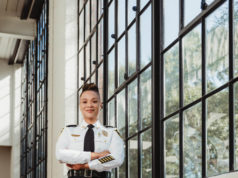
Cobb County’s Talented Women in Tech
By Amy Meadows
There’s a great deal of discussion these days about the gender gap in the technology industry. For decades, tech has been a male-dominated business, with men comprising not only the majority of the top-tier positions nationwide, but also the spectrum of software engineering and programming posts. In fact, according to the National Center for Women & Information Technology (NCWIT), women make up just 26 percent of the computing workforce.
However, times are changing, as more women find their way to STEM-based educational opportunities and recognize their potential across the technology industry. In 2018, NCWIT reveals, 47 percent of AP Calculus test takers were female, as were 28 percent of AP Computer Science test takers. And as the numbers climb, women are finding inspiration from female trailblazers who work in a variety of roles in all kinds of tech-centric companies. Right here in Cobb County, there are wonderful stories of successful women in tech — and Cobb In Focus proudly shines a spotlight on three of them.
Michelle Pluskota: Beyond Expectations
Michelle Pluskota didn’t really know what to think when a former VP for whom she had worked contacted her in 2009 about a job opportunity. The position was with Comcast Business, a division of Comcast, and she initially wondered if she wanted to work for a residential cable company. She had an extensive background with competitive local exchange carriers (CLECs) and incumbent local exchange carriers (ILECs), and she wasn’t sure that the opportunity would be the right fit for her.
“What I didn’t know was the extent of the company’s regional fiber assets already in place at the time, which were more extensive and significant than any company I’d previously worked for,” Pluskota says. “This, coupled with the deep pockets that afforded us the capital we needed to make the investments in the network and the product portfolio, made the offer to join the company a no-brainer.”
This November, Pluskota will celebrate 10 years with Comcast; in 2013, she was promoted to VP of business services for the Heartland Region and then in 2017, she was offered the opportunity to be VP of business services for the Big South Region, which is the largest in the company, spanning 10 states with 15 metro markets. In the role, she is responsible for directing small-to-medium business (SMB) and enterprise sales, which includes everything from Comcast’s Metro Ethernet core to SD-WAN to Advanced Voice Platforms. “While my team doesn’t build the new [Comcast] products, we have to have our fingers on the pulse of what the market needs since we are the feet on the street, talking to our customers, building solutions, and understanding what is happening across the region,” she notes. “Knowing our customers, understanding what they need to compete and win from a technology perspective [is our goal]. “Ensuring we communicate all of this to the teams that innovate and develop not only our products, but also how we support those products, [is crucial to] the businesses we support.”
As Pluskota navigated her career, she never really focused on the fact that she is a woman in the technology industry. “I never thought about my gender as a disadvantage because my parents taught me, amongst many other valuable life lessons, that age, race, and sex don’t define you — it’s what you do that matters,” she says. “That said, my path to get here was more challenging than I expected it would be. However, the landscape has changed so much since I started, and there are so many more women in executive roles than ever before. Comcast, for example, was the first company I worked for that had a woman at the SVP and C level — it showed me what is possible.”
In her current role, Pluskota has achieved her goal of running a region successfully; as she moves forward, she will continue to strive to make that region best in class. She also plans to enjoy what her position with Comcast has provided to her and allowed her to achieve. She concludes, “My favorite part of what I do is seeing those who work either directly for me or those in my organization win. I love seeing people I’ve mentored achieve their career goals. I equally love seeing a team that previously struggled, rise. When I move on to my next thing in the company, I want to leave an organization that is not only stronger than it was, but will also continue to perform, produce future leaders, and thrive long after I am gone.
Sharon Stanley: Making a Difference
Sharon Stanley always has loved math and technology. “To me, tech and math hit the same thing in my brain that music does,” she explains.
That’s why she turned to technology when she was looking for the next chapter of her career after spending 21 years in the military. Stanley had spent her first 10 professional years in the Navy working on anti-sub warfare; she then decided to attend graduate school while still enlisted. She earned a master’s in information systems from Naval Postgraduate School and a master’s in national security and strategic studies from Naval Command and Staff College. As a Commanding Officer at the Naval Computer and Telecommunications Station in Puget Sound, she partnered with the Regional IT Center to implement the first Department of Defense Pacific Northwest Metropolitan Area Network.
“I enjoyed the challenges of technology. I loved what it can do — that it could step in and make easier what were manual processes at the time,” Stanley notes. “It’s always different, and you can always step in and be right at the forefront.”
At the end of her naval career, she began working for Sprint as the director of network operations. After nine years, she needed a break and took a one-year hiatus. When she returned to work, she took a job with McKesson because she wanted to help people and felt that a position with a medical company would fulfill that need in her. Yet, as a member of the corporate IT team, she didn’t get to interact with customers the way she had hoped. She then decided to throw caution to the wind and put her résumé out there — and quickly, serendipity intervened and she found exactly what she wanted.
“This is the best job I’ve ever had,” says Stanley, who has served as director of information services for Cobb County for nearly five years. In her role, she leads the technology strategy and essentially acts as the CIO for the entire county. She works with every agency to develop programs for the good of Cobb citizens, and she directs a centralized IT group to implement new initiatives. “Every project we do has some impact on the citizens or businesses of Cobb County,” she continues. “Everything we do makes things better.”
For instance, her team instituted Cobb Commute with the Department of Transportation; the traffic website provides real-time access to information about congestion, travel speeds, road closures, and more throughout Cobb. They also worked with 911 and Emergency Management to install smart trail markers on trails throughout the area, allowing people to call for help and to be located by emergency responders faster and more efficiently. What’s more, Stanley and her employees have worked with the Board of Elections to create an app to help people learn more about early voting line wait times.
Stanley not only depends on her team to help drive the county’s projects, but also the vendors with whom they work, such as Comcast. “Our vendor partners help a lot. Comcast is one of our success stories, and we have a good and active working relationship. We are working towards being a smart community, and Comcast brings technology to us that can help with that,” she says. “Smart communities bring smart businesses — that’s why we have a five-year digital strategy. And Comcast puts the technology in front of us.”
Working toward those kinds of technology goals — goals that will continue to help the county she calls home — is what drives Stanley. “I love what I’m doing,” she states. “To see the direct results of the projects we roll out and how they have positively impacted Cobb County — it’s so rewarding for me. And I have been able to meet so many people in the county and interact with them. A little piece of them comes with you.”
Heather Orrico: Speak What You Want
When Heather Orrico, director of enterprise sales for Comcast Business, had her first interview with the company, she said something that many people might not have said. “I said, ‘I want to be a leader, and I want you to get me there,’” she recalls. “You always have to speak what you want and go after it wholeheartedly.”
Orrico has exhibited that mindset since pursuing a bachelor’s in computer science and a master’s in finance. She started her professional career as an engineer and ultimately — as she jokes — went to “the dark side” and became a sales engineer. She boasts 20 years in the telecom industry overall (with a brief foray into real estate after the telecom bust in 2002), spending the last three years as a manager with Comcast; she became a director in November of 2018. Today, she works with the Big South Region and supports all of Georgia. Orrico oversees four sales teams, comprised of 30 enterprise sellers on the floor, who help develop innovative digital solutions for all types of business customers. Her teams work across industries, from mid-market firms to large enterprises, from government agencies to medical companies. “Whatever your business need is, we can consult and help you solve for that,” she explains. “Whether it’s Internet WiFi, backup diversity, security systems or even our core video platform, there’s nothing we can’t help you do.”
Because Orrico is passionate about leadership, her current role is an ideal one. “I stay close to the people on the floor — that’s where I get my energy,” she says. “I like to get out of the office and sit with them — to see how they’re doing and what challenges they’re up against.” And when she watches them identify and solve a problem for a client, as well as offer support through the process, it gives her the greatest sense of satisfaction. “When I became a leader, I thought, ‘How am I going to get my wins?’ But you get fulfilled through the success of other people,” she continues. “Whether it’s a manager who needs help or a rep who needs support through a negotiation — that’s my win. It’s unbelievable fulfillment.”
And Orrico only wants to continue on the path she has forged, especially with Comcast. “I’m a ‘Comcaster,’” she says. “I love this place and our people. Our people make us who we are.” That extends to the leaders who have helped her reach her own goals in an industry that is changing, not only in terms of the technology itself, but also when it comes to the people who comprise it. “I entered the industry when I was 22, and certainly there weren’t as many women. But that’s not true these days — there are so many of us out there,” she observes, noting how much Comcast has helped her find her own success. “I’ve never worked for a company that is so committed to a person’s career path. These folks believe in taking care of you,” she concludes. “And if you do the right things, by your company and your team, you can get there. You have to put the work in. You have to build your team. And you have to say what you want. If you do those three things, you can [achieve your goals].”



